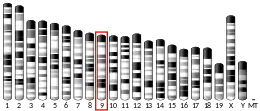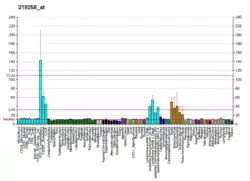TIPIN
TIMELESS-interacting protein is a protein that in humans is encoded by the TIPIN gene.[5][6][7]
Interactions
TIPIN has been shown to interact with Replication protein A1.[8]
References
- GRCh38: Ensembl release 89: ENSG00000075131 - Ensembl, May 2017
- GRCm38: Ensembl release 89: ENSMUSG00000032397 - Ensembl, May 2017
- "Human PubMed Reference:". National Center for Biotechnology Information, U.S. National Library of Medicine.
- "Mouse PubMed Reference:". National Center for Biotechnology Information, U.S. National Library of Medicine.
- Gotter AL (Aug 2003). "Tipin, a novel timeless-interacting protein, is developmentally co-expressed with timeless and disrupts its self-association". Journal of Molecular Biology. 331 (1): 167–76. doi:10.1016/S0022-2836(03)00633-8. PMID 12875843.
- Yoshizawa-Sugata N, Masai H (Jan 2007). "Human Tim/Timeless-interacting protein, Tipin, is required for efficient progression of S phase and DNA replication checkpoint". The Journal of Biological Chemistry. 282 (4): 2729–40. doi:10.1074/jbc.M605596200. PMID 17102137.
- "Entrez Gene: TIPIN TIMELESS interacting protein".
- Unsal-Kaçmaz K, Chastain PD, Qu PP, Minoo P, Cordeiro-Stone M, Sancar A, Kaufmann WK (Apr 2007). "The human Tim/Tipin complex coordinates an Intra-S checkpoint response to UV that slows replication fork displacement". Molecular and Cellular Biology. 27 (8): 3131–42. doi:10.1128/MCB.02190-06. PMC 1899931. PMID 17296725.
Further reading
- Unsal-Kaçmaz K, Chastain PD, Qu PP, Minoo P, Cordeiro-Stone M, Sancar A, Kaufmann WK (Apr 2007). "The human Tim/Tipin complex coordinates an Intra-S checkpoint response to UV that slows replication fork displacement". Molecular and Cellular Biology. 27 (8): 3131–42. doi:10.1128/MCB.02190-06. PMC 1899931. PMID 17296725.
- Gotter AL, Suppa C, Emanuel BS (Feb 2007). "Mammalian TIMELESS and Tipin are evolutionarily conserved replication fork-associated factors". Journal of Molecular Biology. 366 (1): 36–52. doi:10.1016/j.jmb.2006.10.097. PMC 4151250. PMID 17141802.
- Chou DM, Elledge SJ (Nov 2006). "Tipin and Timeless form a mutually protective complex required for genotoxic stress resistance and checkpoint function". Proceedings of the National Academy of Sciences of the United States of America. 103 (48): 18143–7. doi:10.1073/pnas.0609251103. PMC 1654129. PMID 17116885.
- Simpson JC, Wellenreuther R, Poustka A, Pepperkok R, Wiemann S (Sep 2000). "Systematic subcellular localization of novel proteins identified by large-scale cDNA sequencing". EMBO Reports. 1 (3): 287–92. doi:10.1093/embo-reports/kvd058. PMC 1083732. PMID 11256614.
- Bonaldo MF, Lennon G, Soares MB (Sep 1996). "Normalization and subtraction: two approaches to facilitate gene discovery". Genome Research. 6 (9): 791–806. doi:10.1101/gr.6.9.791. PMID 8889548.
This article is issued from Wikipedia. The text is licensed under Creative Commons - Attribution - Sharealike. Additional terms may apply for the media files.




